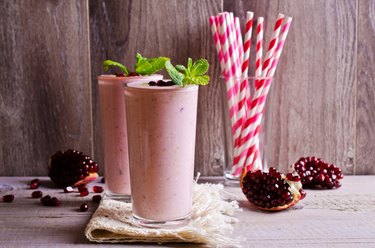
Whether you're trying to gain muscle or you're underweight and need to add a few pounds to boost your health, the principle of weight gain remains the same: You'll need to eat more calories each day than you burn. Fill your diet with nutritious but higher-calorie foods, maintain a consistent elevated calorie intake and follow a weight-training routine to add more weight to your frame.
Calories Needed to Gain 1 Pound
Video of the Day
It takes an added 3,500 calories to gain a pound. To gain weight at a safe rate of around 0.5 to 1 pound each week, you'll need to eat an extra 1,750 to 3,500 calories weekly, which corresponds to an extra 250 to 500 calories a day.
Video of the Day
Use an online calculator to figure out roughly how many calories you need to maintain your weight -- this will vary based on your age, height, weight, gender and activity level -- or consult a nutrition professional for an estimate of your calorie needs. Then tack on the additional 250 to 500 calories a day to start your weight-gain journey.
You might need to adjust your calorie surplus as you go along. If you're gaining weight too slowly, try upping your intake; if you're trying to put on muscle but feel like you're mostly gaining fat, try a slightly smaller calorie surplus for slower weight gain. As you gain weight, you'll also want to adjust your calorie intake. Heavier people need more calories to maintain weight, so as you add pounds to your frame, you'll have to recalculate your calorie needs to keep gaining.
Get Calories From Protein for Muscle Gains
Make sure to include enough protein in your diet while you gain weight, especially if you're trying to gain muscle. Dietary protein supplies amino acids, the building blocks of muscle tissue. How much protein you need depends on your activity level and types of exercise, as well as what you weigh.
For example, the average sedentary adult needs roughly 0.4 grams of protein per pound of body weight. That's about 50 grams for a sedentary 125-pound adult or 60 grams for a 150-pound adult. If you're strength training -- which you should be if you want to gain muscle -- you need up to 0.8 grams of protein per pound. That corresponds to about 100 grams of protein if you weigh 125 pounds and roughly 120 grams if you weigh 150 pounds.
Meats and fish raise your protein intake and can fit into a weight-gain diet. A 3-ounce portion of salmon, for example, has 21 grams of protein, while a 3-ounce serving of roasted chicken breast offers 27 grams, a significant amount of your daily intake. Peanuts, almonds and other nuts also serve as high-calorie sources of protein for weight gain, and eggs, dairy and beans increase your intake as well. For example, a large egg gives you 6 grams of protein, a glass of milk provides 9 grams, a half-cup of canned black beans contributes 8 grams and an ounce of almonds supplies 6 grams.
How to Get More Calories
A weight-gain diet could take some getting used to. Since you're eating more than you're burning each day, you might feel very full after your meals. Avoid being overwhelmed at mealtime by eating three meals and two to three snacks each day, rather than getting all your calories at breakfast, lunch and dinner.
Use healthy but high-calorie fats, like flaxseeds and flax oil, avocados, olive oil, coconut oil, and nuts and nut butters. Try whole-grain toast slathered with almond butter or sweet potatoes mashed with olive oil and herbs for flavor. Spoon high-calorie granola into your oatmeal for crunch and extra calories or add half an avocado to a salad or wrap as a source of calories and fat.
Include healthy liquids in your meal plan too. They serve as a good source of calories, but generally don't trigger feelings of fullness. Eat your meals with a glass of milk or 100 percent fruit juice, or snack on a smoothie made from bananas, protein powder, Greek yogurt, milk, frozen berries and almond butter. Skip sodas and other sweetened drinks, which provide too much sugar and are devoid of essential nutrients.
Working Out for Weight Gain
You still need to work out while you're gaining weight. Exercise offers health benefits, like lower blood pressure and improved mood, and strength training will help you put on muscle. Exercising may help boost your appetite too.
Plan for two to three strength-training workouts weekly that exercise the major muscle groups in your body: legs, buttocks, core, back, abs, shoulders and arms. Use weights for resistance and perform each exercise for four to eight repetitions, increasing the weight when you can comfortably finish your eighth repetition. Which exercises you choose, how many exercises per body part and how much weight you use all depend on your current fitness level and goals -- consult a fitness professional for a program designed to meet your needs.
- McKinley Health Center: Gaining Weight the Healthy Way
- University of Colorado: Eating Strategies to Gain Weight
- Iowa State University Extension: Protein
- HealthAliciousNess: Nutrient Facts Comparison Tool (Salmon, Chicken, Egg)
- HealthAliciousNess: Nutrient Facts Comparison Tool (Milk, Black Beans, Almonds)